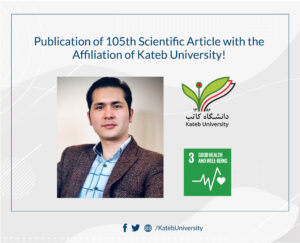In order to achieve the Sustainable Development Solutions (SDGs3: Health and Well-Being), Kateb Research Center has published the 105th scientific article with the affiliation of Kateb University.
Original article by Mr. Reza Fahimi, faculty member and researcher at Kateb Medical Research Center, entitled “Integrated Genomic Analysis Highlights the Impaired PI3K-Akt Signaling Pathway in Alzheimer’s Disease” was published in an ISI and prestigious journal of “Biointerface Research in Applied Chemistry” with the affiliation of Kateb University. It is worth mentioning that this article was published with an impact factor of 2 (IF:2).
Alzheimer’s disease (AD), a leading cause of dementia, remained incurable, despite many advances in our knowledge about AD pathogenesis, underlying mechanisms are poorly understood. Transcriptome analysis showed efficiency in exploring these mechanisms; however, data are generated at a higher pace than interpreted and are almost inconsistent. Therefore we performed this meta-analysis to extract new knowledge from existing data and find the mechanisms involved in AD. Five temporal cortex transcriptomics datasets from 187 AD patients and 167 healthy controls were analyzed. Our analysis showed that the PI3K-Akt signaling pathway is significantly impaired in AD brains and was common among all datasets. Moreover, miRs targeting genes involved in the PI3K-Akt signaling pathway were identified. In conclusion, our results highlight the impaired PI3K-Akt signaling pathway in AD and suggested related miRs as the potential targets for early treatment and diagnosis of AD.
Interested people can find the article here.

Sharing: